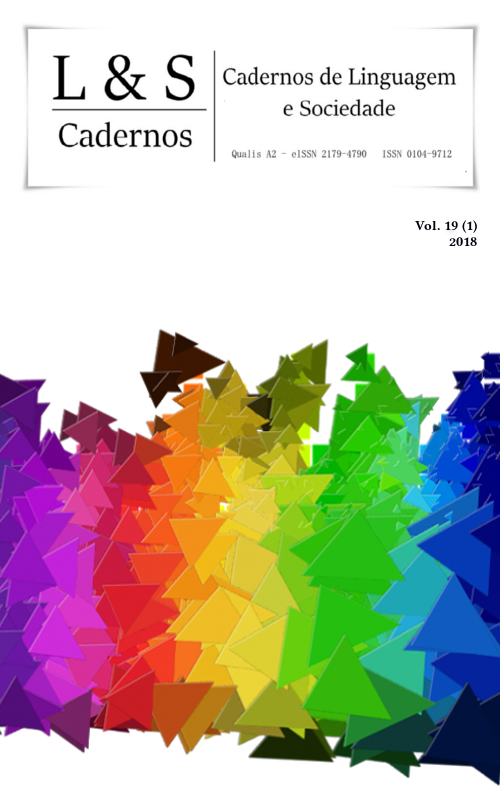DEUS LHE PAGUE: O AGRADECIMENTO COMO ESTRATÉGIA DE PROTESTO NA CANÇÃO DE CHICO BUARQUE
DOI:
https://doi.org/10.26512/les.v19i1.10873Palavras-chave:
Chico Buarque; MPB; Modelo de Análise Modular do Discurso; ditadura militar brasileira.Resumo
Neste trabalho, estudamos a canção “Deus lhe pague”, do compositor Chico Buarque, a fim de investigar como as emoções são expressas por meio do discurso. Veiculada inicialmente em 1971, a canção constitui um ato de resistência do compositor contra a Ditadura Militar que se instaurou no Brasil durante duas décadas, a partir de 1964. Realizado com base em contribuições teóricas do Modelo de Análise Modular do Discurso, o trabalho revela que o agradecimento irônico de que a canção se constitui corresponde a uma estratégia discursiva com a qual o locutor representado na canção ataca seu interlocutor ”“ a Ditadura ”“ e expressa as emoções de ódio e indignação que as ações praticadas por este causavam em parte da população. Ao mesmo tempo, com essa estratégia, o locutor ameniza a agressividade do ataque, tendo em vista o temor causado por esse interlocutor, inimigo poderoso e capaz de atos desmedidos de violência.
Downloads
Referências
BAKHTIN, M. Estética da criação verbal. São Paulo: Martins Fontes, 2003.
BROWN, P; LEVINSON, S. Politeness: some universals in language use. Cambridge: Cambridge University Press, 1987.
CHABROL, C. De l’impression des personnes à l’expression communicationnelle des émotions. In: PLANTIN, C.; DOURY, M.; TRAVERSO, V. (Orgs.), Les émotions dans les interactions. Lyon: Presses universitaires de Lyon, 2000, p. 105-123.
CHARAUDEAU, P. Une problématisation discursive de l’émotion : à propos des effets de pathémisation à la television. In: PLANTIN, C.; DOURY, M.; TRAVERSO, V. (Orgs.), Les émotions dans les interactions. Lyon: Presses Universitaires de Lyon, 2000, p. 125-155.
CULPEPER, J. Towards an anatomy of impoliteness. In: Journal of Pragmatics, 1996, v. 25, p. 349-367.
CULPEPER, J.; BOUSFIELD, D.; WICHMANN, A. Impoliteness revisited: with special reference to dynamic and prosodic aspects. In: Journal of Pragmatics, 2003, v. 35, p. 1545-1579.
CUNHA, G. X. Uma proposta para o tratamento das relações de discurso temporais no Modelo de Análise Modular do Discurso. In: Revista do GEL, 2012, v. 9, p. 29-49.
CUNHA, G. X. A construção de imagens de si no discurso organizacional. In: TOMAZI, M. M.; ROCHA, L. H. P.; POMPEU, J. C. (Orgs.). Estudos discursivos em diferentes perspectivas: mídia, sociedade e direito. São Paulo: Terracota Editora, 2016, p. 111-126.
CUNHA, G. X. Conectores e processo de negociação: uma proposta discursiva para o estudo dos conectores. Fórum Linguístico, 2017, v. 14, p. 1699-1716.
DUCROT, O. O dizer e o dito. Campinas: Pontes, 1987.
FILLIETTAZ, L. Négociation, textualisation et action: le concept de négociation dans le modèle genevois de l’organisation du discours. In: GROSJEAN, M.; MONDADA, L. (Orgs.) La négociation au travail. Lyon: Presses universitaires de Lyon, 2004, p. 69-96.
FILLIETTAZ, L. La place du contexte dans une approche praxéologique du discours : le cas de l’argumentation dans les interactions scolaires. In: Pratiques, 2006, v. 129-130, p. 71-88.
GOFFMAN, E. La mise em scène de la vie quotidienne: les relations em public. v. 2. Paris: Les éditions de minuit, 1973.
GOFFMAN, E. The interaction order. In: American Sociological Review, 1983, v. 48, p. 01-17.
GOFFMAN, E. A representação do eu na vida cotidiana. Petrópolis: Vozes, 2009.
GOFFMAN, E. Ritual de interação: ensaios sobre o comportamento face a face. Petrópolis: Vozes, 2011.
GRICE, H. P. Logic and conversation. In: COLE, P.; MORGAN, J. L. (Orgs.) Sintax and semantics: speech acts. New York: Academic Press, 1975, p 41-58.
HOLLANDA, C. B. Deus lhe Pague. , 1971. Acesso: 04 jun. 2017.
HOLLANDA, C. B. Apesar de você. , 1971. Acesso: 04 jun. 2017.
KERBRAT-ORECCHIONI, C. Les interactions verbales. Paris: Colin, 1992.
KERBRAT-ORECCHIONI, C. Les actes de langage dans le discours: théorie et fonctionnement. Paris: Nathan, 2001.
KERBRAT-ORECCHIONI, C. Análise da conversação: princípios e métodos. São Paulo: Parábola Editorial, 2006.
LEECH, G. N. Principles of pragmatics. Londres: Longman, 1983.
LEECH, G. The pragmatics of politeness. Oxford: Oxford University Press, 2014.
MAINGUENEAU, D. Novas tendências em Análise do Discurso. Campinas: Pontes, 1997.
MENESES, A. B. Desenho mágico: poesia e política em Chico Buarque. São Paulo. Ateliê Editorial, 2002.
MOESCHLER, J. Argumentation et conversation: éléments pour une analyse pragmatique du discours. Paris: Hatier-Credif, 1985.
NAPOLITANO, M. História e música: história cultural da música popular. Belo Horizonte: Autêntica, 2005.
ROULET, E. La description de l’organisation du discours. Paris: Didier, 1999.
ROULET, E. The description of text relation markers in the Geneva model of discourse organization. In: FISCHER, K. (Org.). Approaches to discourse particles. Amsterdam: Elsevier, 2006, p. 115-131.
ROULET, E. et al. L’articulation du discours en français contemporain. Berne: Lang, 1985.
ROULET, E.; FILLIETTAZ, L.; GROBET, A. Un modèle et un instrument d'analyse de l'organisation du discours. Berne: Lang, 2001.
RUFINO, J. A. As mulheres de Chico Buarque: análise da complexidade discursiva de canções produzidas no período da ditadura militar. Dissertação de mestrado, Universidade Federal de Minas Gerais, Belo Horizonte, Brasil, 2006.
RUFINO, J. A. As minhas meninas: análise de estratégias discursivas em canções buarqueanas produzidas no período da Ditadura Militar. Dissertação de doutoramento, Universidade Federal de Minas Gerais, Belo Horizonte, Brasil, 2011.
SEARLE, J. R. Expressão e significado: estudos da teoria dos atos da fala. São Paulo: Martins Fontes, 1995.
Downloads
Publicado
Como Citar
Edição
Seção
Licença
Autores/as que publicam nesta revista concordam com os seguintes termos:
Autores/as mantêm os direitos autorais e concedem à revista o direito de primeira publicação, sendo o trabalho simultaneamente licenciado sob a https://creativecommons.org/licenses/by-nc-nd/4.0/o que permite o compartilhamento do trabalho com reconhecimento da autoria do trabalho e publicação inicial nesta revista.



